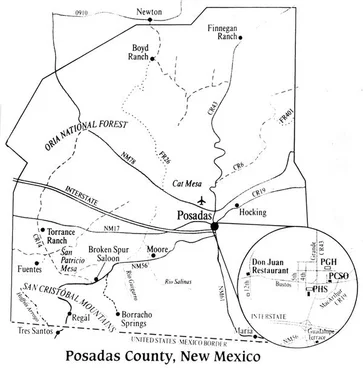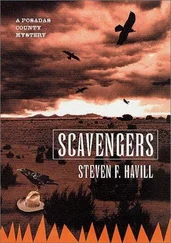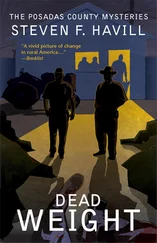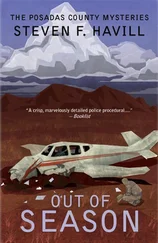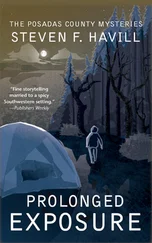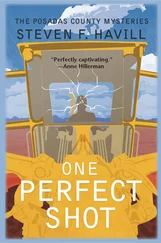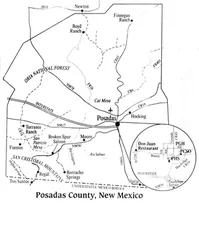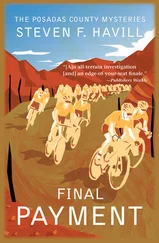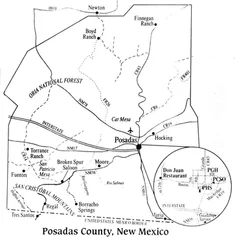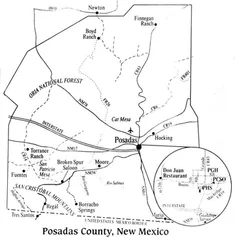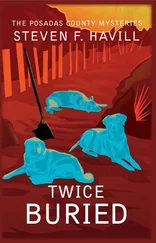Steven Havill - A Discount for Death
Здесь есть возможность читать онлайн «Steven Havill - A Discount for Death» весь текст электронной книги совершенно бесплатно (целиком полную версию без сокращений). В некоторых случаях можно слушать аудио, скачать через торрент в формате fb2 и присутствует краткое содержание. Год выпуска: 2011, ISBN: 2011, Издательство: Poisoned Pen Press, Жанр: Полицейский детектив, на английском языке. Описание произведения, (предисловие) а так же отзывы посетителей доступны на портале библиотеки ЛибКат.
- Название:A Discount for Death
- Автор:
- Издательство:Poisoned Pen Press
- Жанр:
- Год:2011
- ISBN:978-1-61595-078-2
- Рейтинг книги:5 / 5. Голосов: 1
-
Избранное:Добавить в избранное
- Отзывы:
-
Ваша оценка:
- 100
- 1
- 2
- 3
- 4
- 5
A Discount for Death: краткое содержание, описание и аннотация
Предлагаем к чтению аннотацию, описание, краткое содержание или предисловие (зависит от того, что написал сам автор книги «A Discount for Death»). Если вы не нашли необходимую информацию о книге — напишите в комментариях, мы постараемся отыскать её.
A Discount for Death — читать онлайн бесплатно полную книгу (весь текст) целиком
Ниже представлен текст книги, разбитый по страницам. Система сохранения места последней прочитанной страницы, позволяет с удобством читать онлайн бесплатно книгу «A Discount for Death», без необходимости каждый раз заново искать на чём Вы остановились. Поставьте закладку, и сможете в любой момент перейти на страницу, на которой закончили чтение.
Интервал:
Закладка:
Chapter Ten
The district attorney hesitated in mid-sentence, one hand poised in the air as if his orchestra was locked in a pause before the next movement. His other hand shuffled the notes on the lectern. Estelle Reyes-Guzman waited, aware that District Attorney Daniel R. Schroeder knew exactly what he wanted to ask, that the notes he wanted were right there on top of the heap. The grand jurors sat silent and watchful, eager to hear secret testimony that was better than the juiciest gossip.
Schroeder finally looked up, his hand still raised. He looked at the jurors as if surprised to find them still in attendance, grimaced, and dropped his hand.
“Undersheriff Guzman, when did your department commence its investigation into the affairs of Mr. George Enriquez?”
“In early February of this year, sir.”
“Would you explain for the jury what it was that prompted that investigation?”
“We were in the process of investigating the circumstances of a fatal fire that destroyed the home of Eleanor Pope. Mrs. Pope’s son, Denton, died in that fire.”
“And in that case,” Schroeder interrupted, “you had reason to believe that Denton Pope might have tried to set that house on fire so that he could collect on the home-owner’s policy held by his mother. Is that correct?”
“Yes, sir.”
“Would you describe how the fire occurred.”
Estelle took a deep breath and looked at the jury. A heavy-set, elderly woman in front was either jotting notes or writing a letter to a relative. When the courtroom fell silent, the woman looked up. “It appeared that Denton Pope punched a small hole in the propane line to the wall furnace,” Estelle said. “That caused a massive leak of propane fumes into the house. He also placed a pan of gasoline under the stove, apparently to act as an accelerant. When the thermostat was turned up and triggered the furnace igniter, the whole thing blew up.”
“The plan being that his mother-or someone-would come home and turn up the thermostat in the chilly house, and the furnace would explode.”
“It appears so, sir.”
“And there is some evidence that the late Mr. Denton Pope actually turned up the thermostat himself. Is that correct?”
“Yes, sir.”
“Why would he do that?”
“It appears to have been a mistake, sir.”
Schroeder looked at the jury, the crow’s-feet around his eyes deepening. “So he blew himself up. But that wasn’t his intention, was it.” The question was phrased as an aside, and Estelle didn’t respond. There was no need for the grand jury to indict a dead man. The district attorney shifted his papers again. “Eleanor Pope subsequently died from stroke complications. Is that correct?”
“Yes, sir.”
“Not from fire-related injuries?”
“No, sir. She wasn’t home at the time.”
“Were you at any time able to interview Mrs. Pope after the fire that killed her son?”
“No, sir.”
“Why is that?”
“She suffered a stroke that night, shortly after receiving news of the fire. She slipped into a coma and never recovered.”
“During the routine investigation that followed the fatal fire…” and Schroeder paused again. Estelle wondered if he was reflecting on the word routine , since nothing about the Pope case had been “routine.”
“Would you tell the grand jury what you discovered after the fire relative to the Popes’ home-owner’s insurance.”
“We could find no record of a home-owner’s policy, sir.”
“No written record at all?”
“No, sir.”
“So such a policy did not exist. Is that correct?”
“We did not find one, sir.”
The half smile again touched Schroeder’s face. “It’s possible that the paperwork burned in the fire?”
“Yes, sir.”
“Did you make enquiries with various insurance agents to that effect?”
“Yes, sir.”
“And no policy was ever issued, as far as these various agents were concerned?”
“That’s correct.”
“Was one of the agents whom you queried Mr. George Enriquez?”
“Yes, sir.”
“And he told you that no such policy existed?”
“Yes, sir. The Popes had no home-owner’s policy with his firm.”
“Did Mrs. Pope have any insurance at all with Mr. Enriquez’s agency?”
“Yes, sir. She had auto insurance.”
Schroeder stopped and thrust out his lower lip, regarding the papers in front of him. He patted the lectern and turned to the jury. Estelle glanced at the eight faces and saw the keen interest of a jury that was listening to the first witness in a case destined to be a long one. By the twenty-fifth witness, the open-eyed coma would have set in, and the difficulty of Schroeder’s job would escalate.
“Did there come a time,” Schroeder said carefully, still looking at the jurors, “when you found evidence suggesting that Mrs. Eleanor Pope in fact had been making payments for home-owner’s insurance?”
“We were able to establish that Eleanor Pope had written checks on a monthly basis to George Enriquez.”
“And you were led to believe that those payments were for home-owner’s insurance?”
“Yes, sir.”
“What led you to that conclusion?”
“On several of the checks, Mrs. Pope had made the notation ‘house insurance.’” One of the jurors chuckled.
Schroeder lifted a clear plastic folder from the lectern and walked across to the witness stand. He handed the folder to Estelle.
“Do you recognize these, Undersheriff Guzman?”
“Yes, sir.”
“Would you identify them for the jury.”
“They’re several of the checks written by Eleanor Pope to George Enriquez.”
Schroeder nodded, took the exhibit, and handed it to the jury. “Where were they found?”
“In a desk drawer in the burned trailer.”
“A metal desk?”
“Yes, sir.”
“And despite the protection of the metal drawer, we can still see scorching and water stains. But they’re quite readable, aren’t they.”
“Yes, sir.”
“Undersheriff, are those checks written to Mr. Enriquez’s insurance agency?”
“No, sir.”
“To whom are they written?”
“They’re written to Mr. Enriquez personally, sir.”
“Is that a usual procedure, to write checks to an agent rather than an agency ?”
“I don’t know what the usual procedure is for an insurance agent, sir.”
Schroeder smiled and ducked his head, then grinned at the jury. “What is your practice when you write checks for your own home-owner’s insurance, Undersheriff Guzman?”
“I write them to the home office of the insurance company, sir.”
“And so do I.” He patted the railing of the jury box enclosure. “And so do most of you folks, I’m sure.” Still standing in front of the jurors, he turned to look at Estelle. “During the course of your investigation, you found no insurance policy at all. Is that correct?”
“We found no policy. That’s correct.”
“So it appears that Mrs. Pope was writing monthly premium checks…each one for…” and he leaned over the jury box rail, twisting his head so that he could see the checks being scrutinized at that moment by Mark Harrell, a retired cabinet maker. “…eighty-seven dollars and fifty-seven cents, without any policy in hand. Something over a thousand dollars a year.”
Schroeder returned to the lectern and thrust his hands in his suit coat pockets. “Undersheriff, did you have reason to believe that Mrs. Pope thought that she had home-owner’s insurance?”
“Yes, sir.”
“What led you to that conclusion?”
“One of the sheriff’s department employees had a conversation with Mrs. Pope some time before the fire-a casual conversation in passing. The subject of house insurance came up.”
Читать дальшеИнтервал:
Закладка:
Похожие книги на «A Discount for Death»
Представляем Вашему вниманию похожие книги на «A Discount for Death» списком для выбора. Мы отобрали схожую по названию и смыслу литературу в надежде предоставить читателям больше вариантов отыскать новые, интересные, ещё непрочитанные произведения.
Обсуждение, отзывы о книге «A Discount for Death» и просто собственные мнения читателей. Оставьте ваши комментарии, напишите, что Вы думаете о произведении, его смысле или главных героях. Укажите что конкретно понравилось, а что нет, и почему Вы так считаете.
